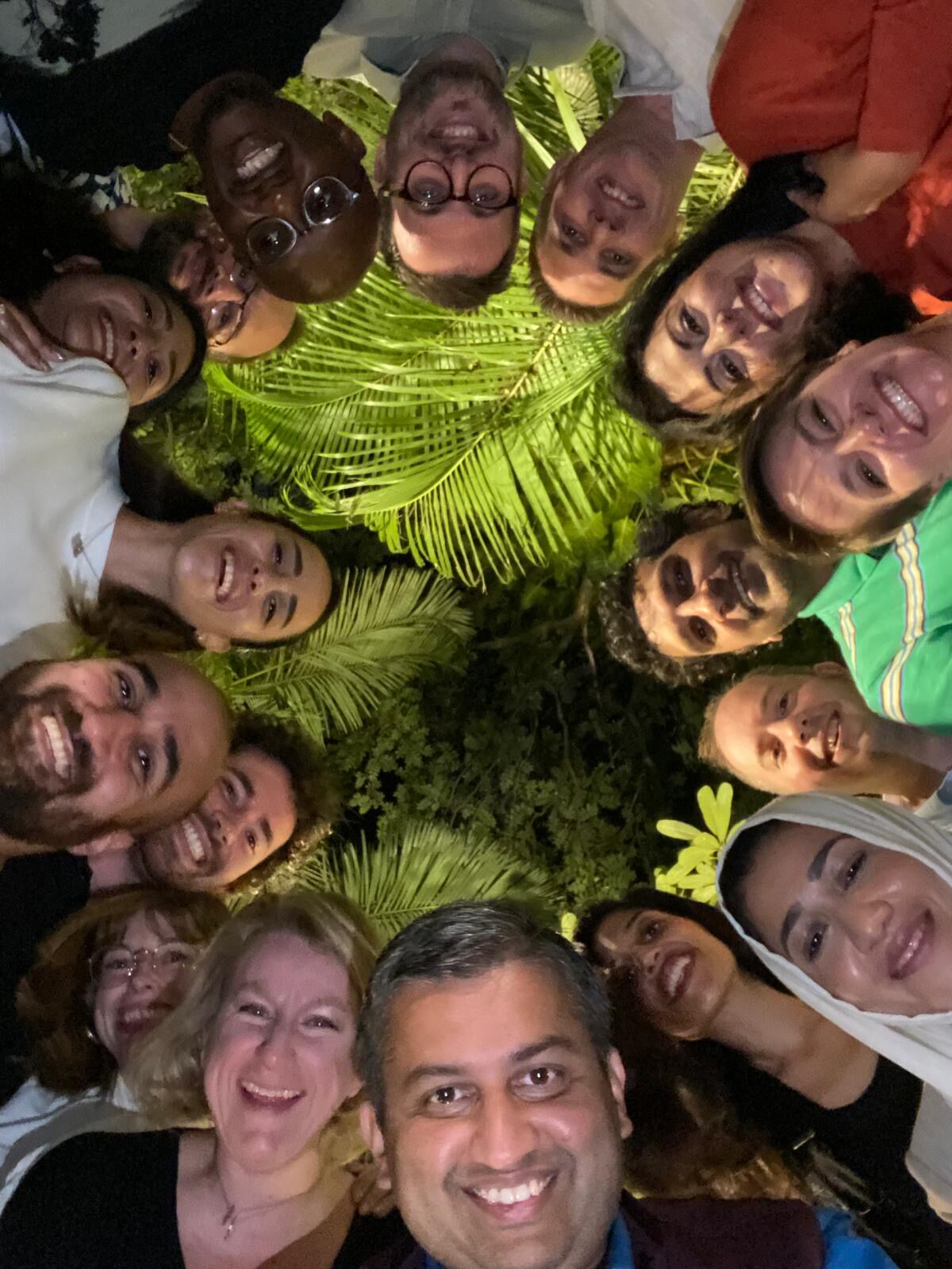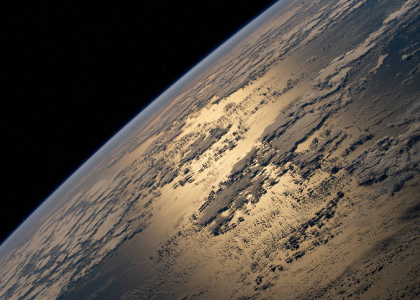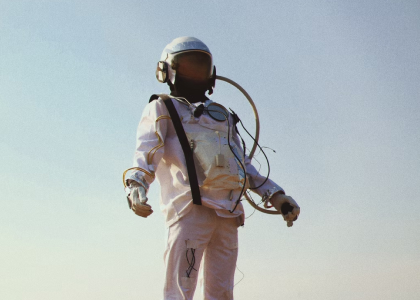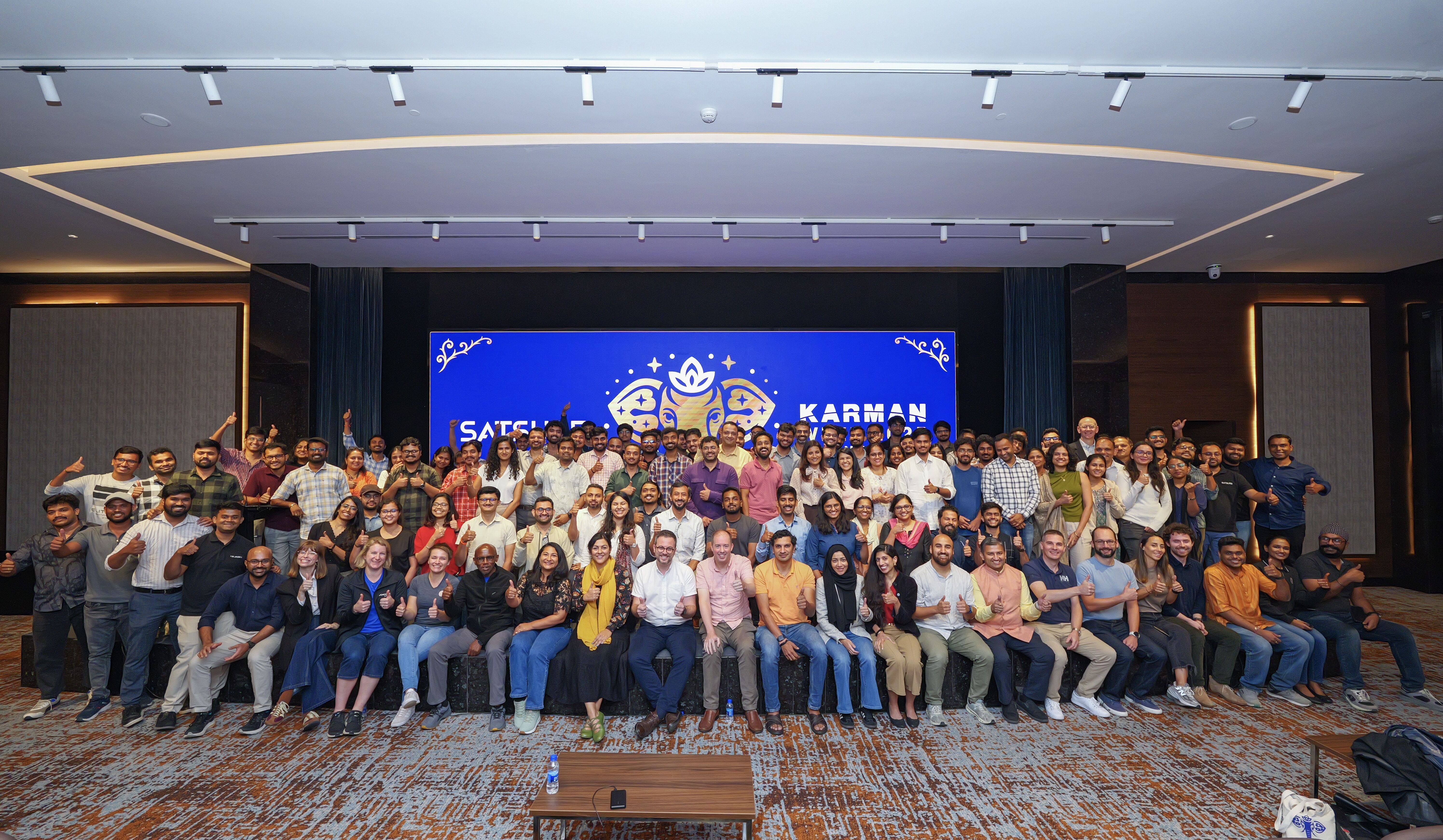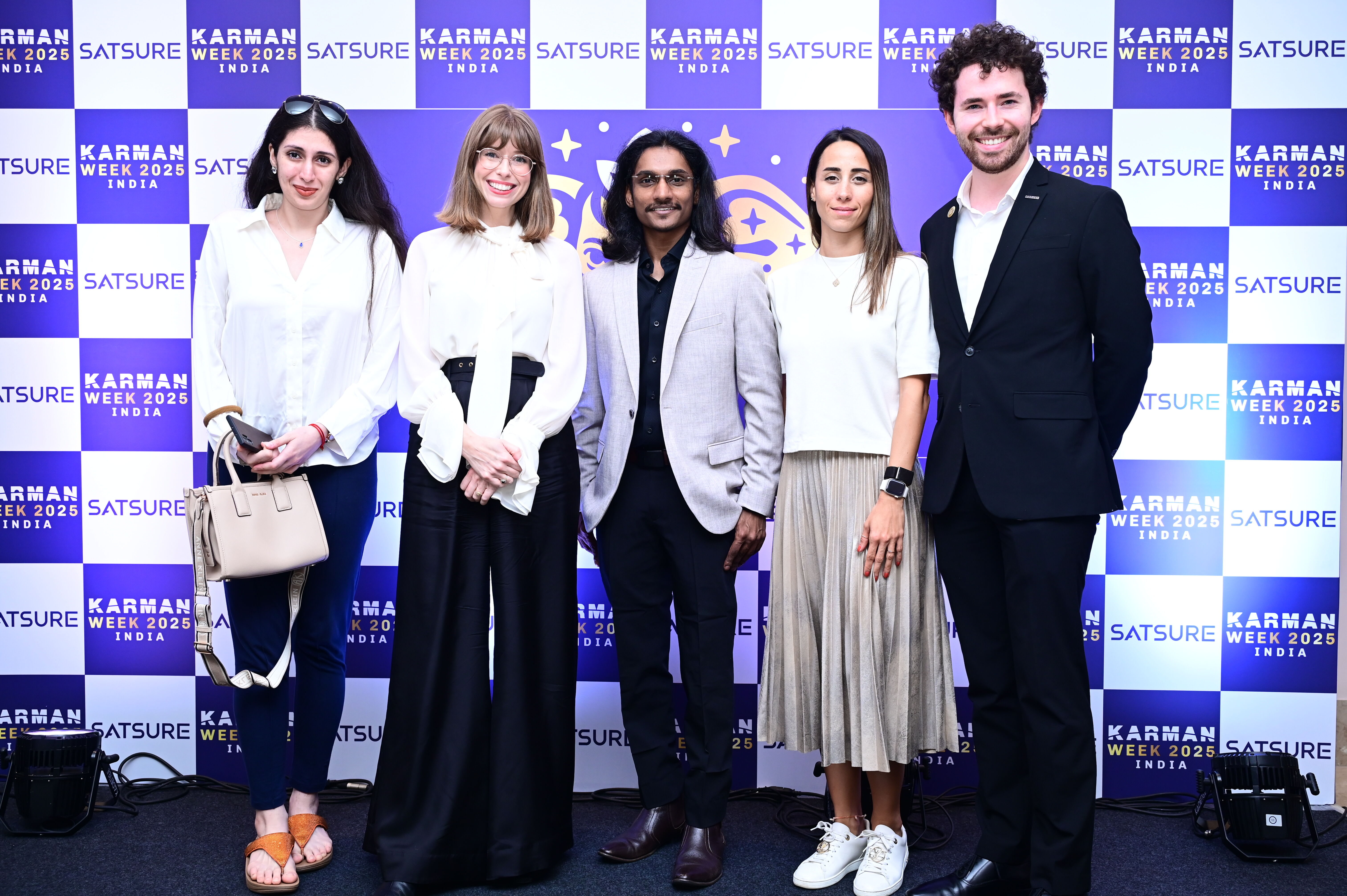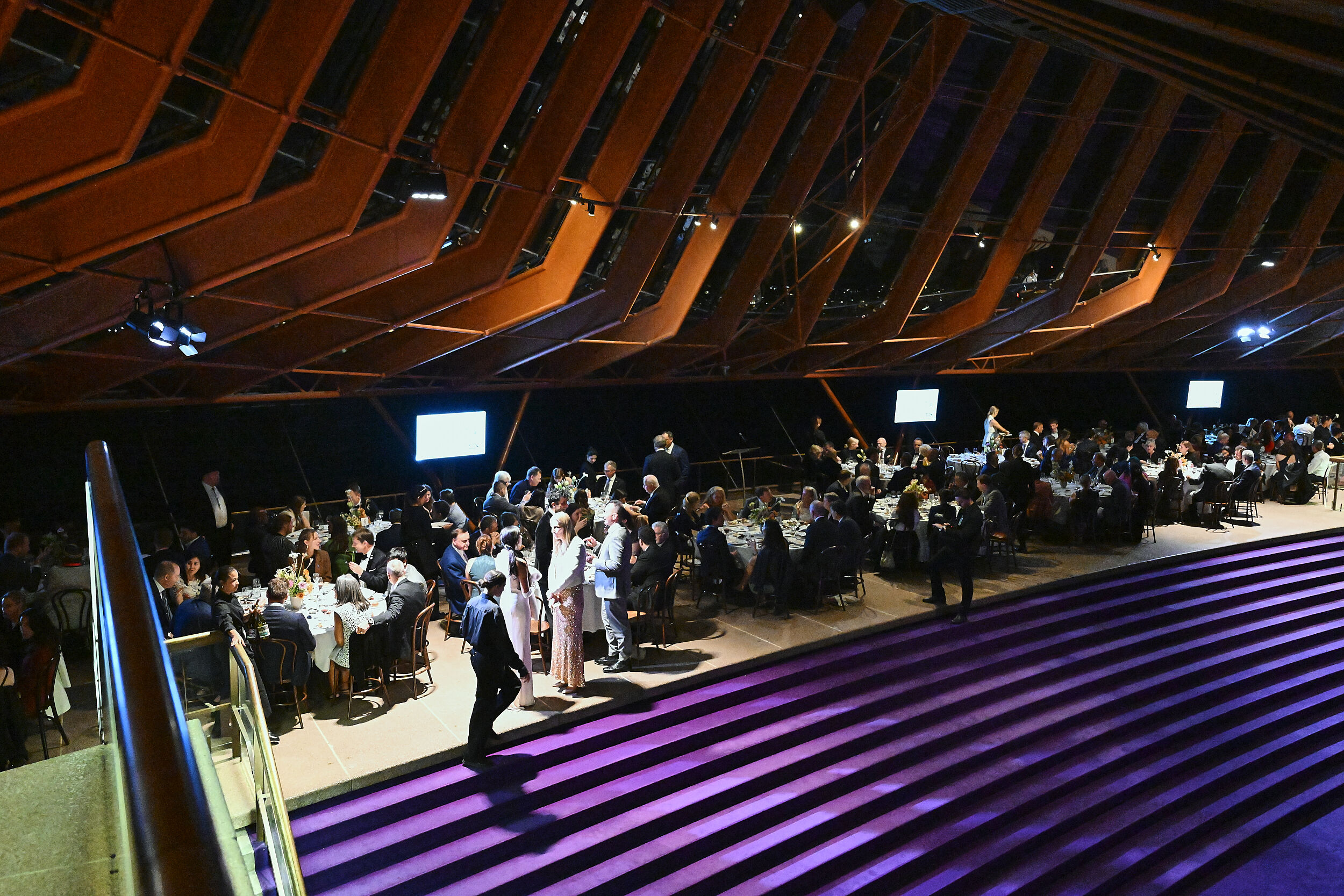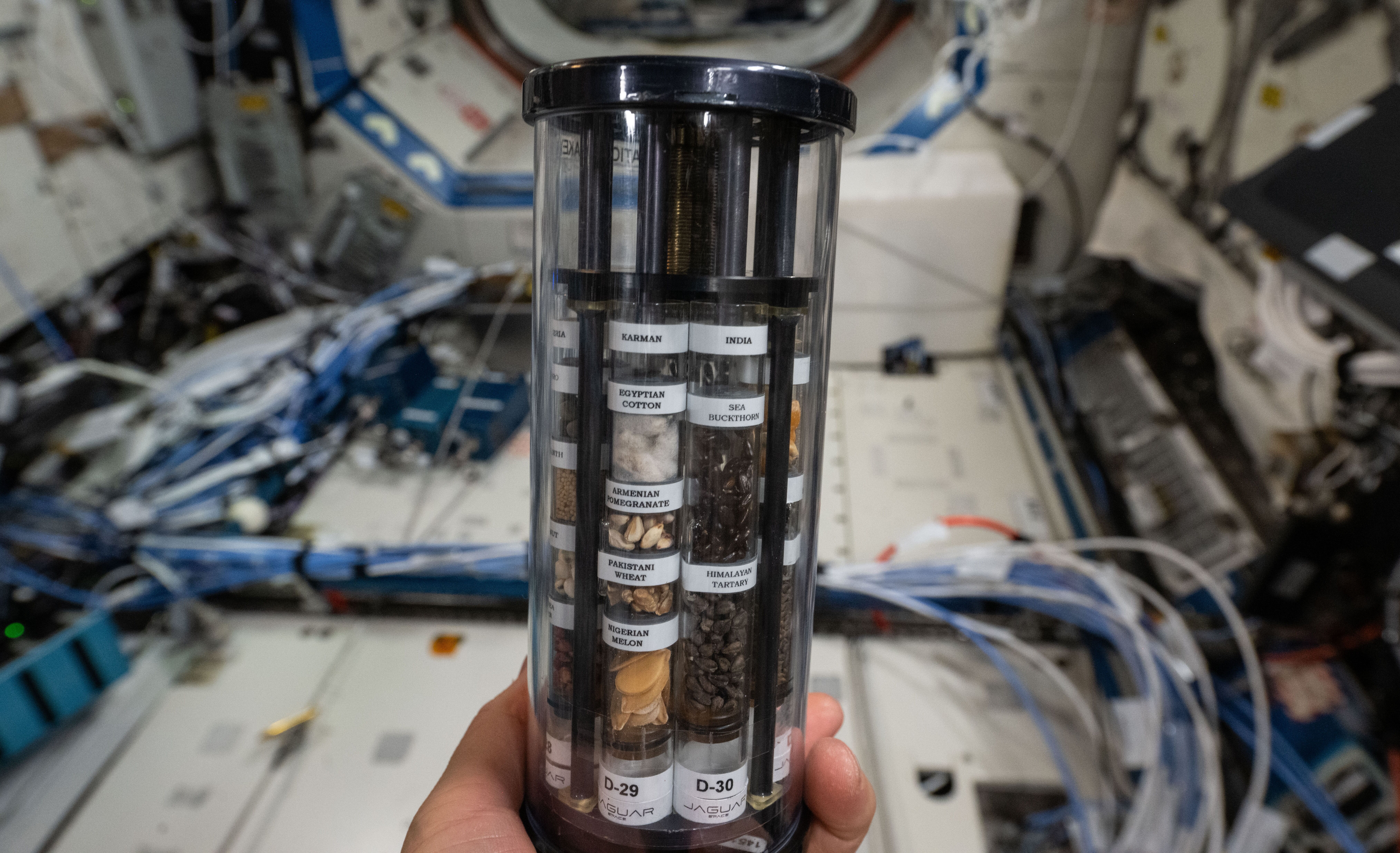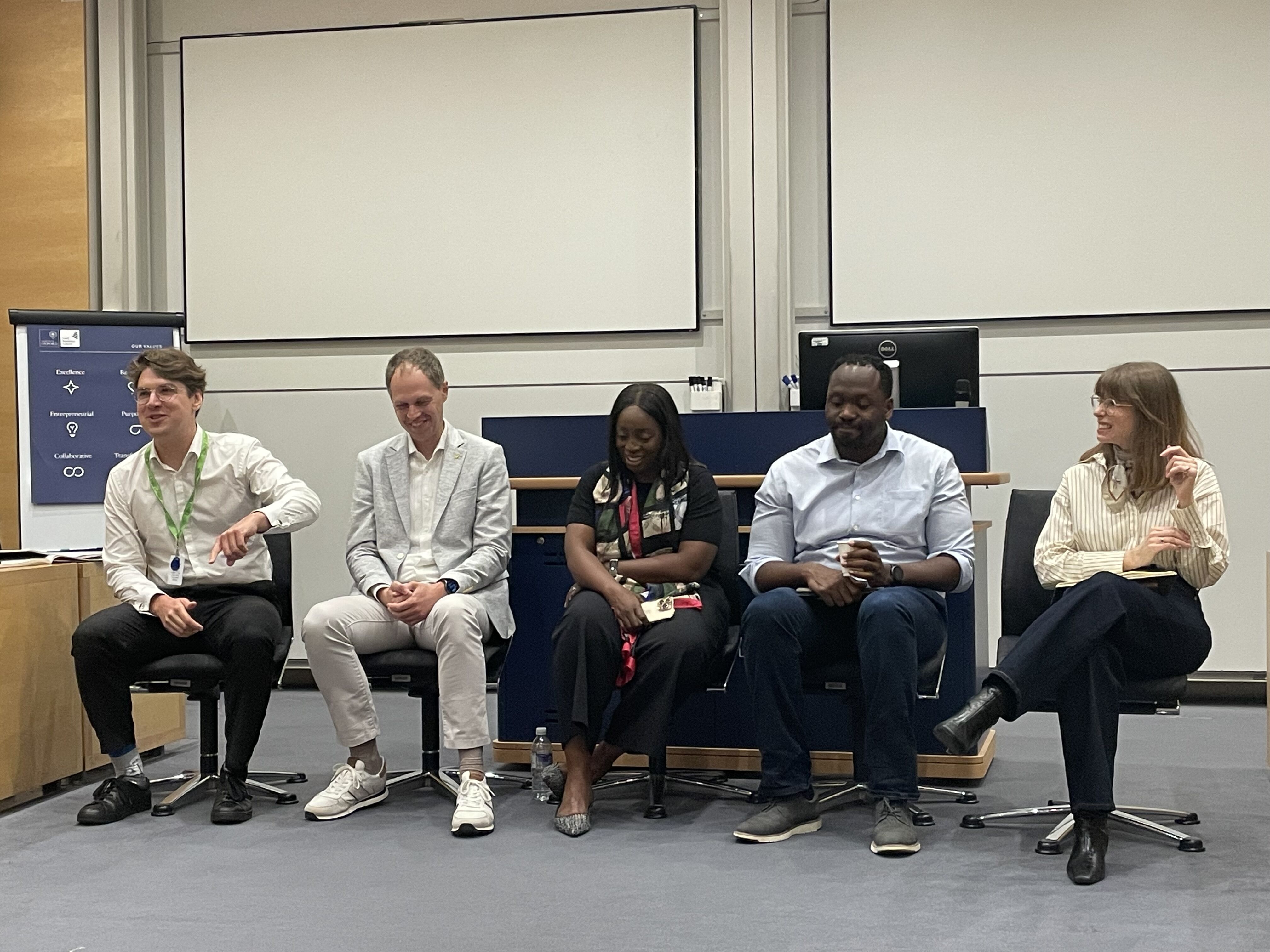By Adrian Flynn
Karman Week 2025 wrapped on November 1, marking another successful edition of The Karman Project’s annual Fellowship Summit, and a milestone moment for our growing engagement with India’s dynamic space ecosystem. Hosted in Bangalore, this year’s Karman Week embodied our mission to catalyse cooperation, build trust, and foster peace in space by bringing leaders across the world together in meaningful, deeply human ways.
The Karman Project drives change by working directly with leaders and building community. Trust isn’t built between nations or institutions, it’s built between people, and it is often the spark that ignites profound, long-term impact. Karman Week 2025 illustrated this multiplier effect beautifully. What began as a poolside conversation in Dubai during Karman Week 2021 with 2020 Fellow Prateep Basu, 2021 Fellow Priyanka Rajkakati, 2021 Fellow Pierre Bertrand, Co-Founder Ke Wang, Karman Pioneer Divyanshu Poddar, and Managing Director Hannah Ashford, became a shared vision to bring Karman Week to India. That vision took shape through continued collaboration, further solidified when Karman Pioneer Akash Yalagach attended the Karman-Oxford Smart Space Elective in 2023. Then, from October 28 to November 1 this year, that vision became a reality in Bangalore.
“Some weeks remind you why you do what you do. Karman Week in India was one of them… In India, trust was built. Friendships were born. People who might never have met found themselves sitting side by side, dreaming together about the future of space. In just five days, countless conversations were had, laughter was shared, challenges were explored, and hopes for a peaceful future of space were discussed. We even played (or at least tried to play!) a game of cricket together. For me personally, space has always felt like a complex topic, coming from a non-space background. Yet every Karman Week feels like home.”
— Öykü Gursu, Director of Fundraising & Partnerships, The Karman Project
Day One: Opening Doors, Opening Dialogue
Karman Week began on October 28 with a warm welcome at SatSure’s Headquarters. Opening presentations from SatSure CEO Prateep Basu, KaleidEO CEO Arpan Sahoo, and Karman Managing Director Hannah Ashford set the stage for a week focused on collaboration, creativity, and real-world impact. A dynamic Q&A and networking session with the SatSure and KaleidEO teams helped Fellows promptly begin to explore new avenues for partnership across India’s thriving space sector. Together with our stellar host partner SatSure, we put our shared belief into practice from day one: genuine cooperation emerges when people come together, ask questions, and explore ideas.
Out in the city, the Fellows toured Bangalore Palace and enjoyed a “hands-on” introduction to the rich flavors of Karnataka cuisine served on banana leaf.
“A director of an African space agency, an Arab astronaut, and a French head of innovation walk into a restaurant. It sounds like the start of a joke, but it actually happened! Just one of those surreal, inspiring moments during the Karman Fellowship week in India… The dream of space for peace often meets the reality of space for power. Nations race to assert sovereignty and secure advantage, even as we speak of collaboration and shared purpose. The Karman Project is here to remind us that every partnership across borders, every Earth observation mission, every astronaut’s journey, and every dialogue between competitors is a quiet act of defiance against the status quo - because peace in space, and on Earth, will never happen by accident; it is a choice we make together.”
— Mohammed Iranmanesh, 2025 Karman Fellow
Day Two: Trust as the Engine of Cooperation
Day Two turned inward as Fellows reflected on the future of space cooperation, drawing lessons from history and shaping Karman Commitments as pathways for collective action. At its heart, the entire endeavour is defined by one through-line: building trust among the Karman Fellowship Cohort, those distinguished leaders shaping the future of space.
Trust is the invisible engine of cooperation, underpinning every enduring partnership on Earth and in orbit. Karman Week 2025 created the conditions for Fellows to actively and intentionally cultivate it. In self-led, in-depth sessions operating under the Chatham House Rule, Fellows explored topics ranging from whether shared interests in space can bridge geopolitical rivalries to the future of human spaceflight and the role of space in development and diplomacy. This secure environment enabled candid discussions and open exchange of ideas (punctuated by laughter and a touch of occasional Greek tragic theatrics) that build genuine understanding and lay the groundwork for lasting partnerships.
This thoughtfully facilitated, flexible approach is central to our mission of fostering cooperation and peace in space, starting squarely with the very human relationships among leaders in the sector.
“The dialogue between the group was built on an implicit trust that we all believed in a shared goal which resulted in a level of openness in the conversations that is rarely seen. This led to some really insightful outcomes for the targeted discussions and amazing connections built between the cohort… The overall goal of The Karman Project is to help build a collaborative future in space. Each of the Fellows believe in this mission and in part this goal aligns to the objectives of the various organisations we represent. However, by having a shared mission it meant that badges could be left at the door and we could work together under a singular goal. The outcome of this has been a set of Karman Commitments from the cohort which are tangible actions we will all take back to our roles so that collectively we can build toward this common goal. A really inspiring week made possible by a group of brilliant individuals!”
— Andrew Ratcliffe, 2025 Karman Fellow
Day Three: Public Day, Where India’s Space Momentum Meets Global Cooperation
Our 2025 Karman Fellows joined leaders from across India’s space ecosystem for Public Day, a forum designed to exchange ideas and build capacity for a more responsible, inclusive, and thriving space economy. It was both a celebration of India’s expanding role in the global space landscape and a platform for candid dialogue on sustaining that growth for the benefit of society.
Hosted in partnership with SatSure and with the participation of Bangalore space community, the morning’s roundtables explored Earth Observation (EO) and climate applications, space financing, dual-use technologies/regulation, and space infrastructure development, all under the Chatham House Rule to encourage open, trust-based exchange.
Participants discussed how the next leap in the space economy will come from integrated ecosystems and public-private partnerships, noting that India’s fast-growing network of startups and government initiatives offers a dynamic model for this evolution. Building on SatSure’s expertise in EO data analysis, conversations highlighted from different perspectives how AI, ML, and EO data integration can enhance climate risk assessment, optimize infrastructure, and strengthen agricultural productivity, not just through sharper imagery, but through robust data systems capable of transforming petabytes of raw data into actionable intelligence. This aligns with a growing consensus: the future of geospatial intelligence lies in interoperability, scalability, and accessibility that can tap into pre-identified local needs.
The evening heralded the Space Cooperation Summit at the Taj West End Ballroom, bringing together leaders across government, industry, and academia to celebrate India’s rapid rise as a global space partner. The Summit featured panels on expanding Indian space capabilities, identifying growth opportunities in emerging space markets, and building a sustainable future in space by incorporating diverse perspectives at its core. We were also honoured to welcome members of the extended Karman Community, whose continued engagement embodies our commitment to giving back and advancing shared progress in space.
A cornerstone of each Karman Week is translating global expertise into on-the-ground impact, and Public Day 2025 rose to the occasion. The connections made will continue as momentum, shaping decisions in boardrooms, classrooms, and policy circles across India and beyond. From indigenous EO satellite programs to remarkable private-sector innovation, India’s unique combination of talent, infrastructure, and policy momentum is positioning it as a bridge between nations at all stages of space activity. As one Fellow noted, “India is demonstrating how democratizing access to space data can democratize opportunity on Earth.”
As a symbol of enduring collaboration and a token of gratitude, the Karman Team presented SatSure with seven Sycamore “Moon Tree” seeds, direct descendants of those that journeyed to the Moon and back aboard the Apollo 14 mission. In another example of Karman circular giveback, the seeds were procured and gifted by 2023 Karman Fellow Trent Tresch.
“Creating a Community built with people that believe in the power of international collaboration, cultivating responsible space activities, is what makes it so special! We shared this unique experience together, and made friendships for life! And don’t forget: τὰ πάντα ῥεῖ καὶ οὐδὲν μένει”
— Fani Kallianou de Jong, 2025 Karman Fellow
Day Four: Inspiration from India’s Next and Current Generation of Space Leaders
Karman Week wrapped with a day of dynamic local engagement, from India’s next generation of spacefarers to India’s current prime spacefarer!
One of the most uplifting engagements of Karman Week 2025, was our visit to the Indian Institute of Science (IISc) in Bangalore, where Fellows spent a lively morning with students ranging from primary school to PhD level, exploring opportunities together to join the space sector and shape its future.
Fellows Lucie Low, Andrew Ratcliffe, and Charles Mwangi shared their personal journeys in space and highlighted opportunities now open to students in their fields. Andrew spoke about his passion for ensuring long-term space sustainability and debris mitigation, a challenge requiring global collaboration. Lucie highlighted the transformative potential of science conducted in space and the opportunities it opens for researchers worldwide. Charles championed access to space as a tool for local economic development and youth empowerment.
Students were especially captivated by our “Living in Space” panel, featuring our three astronaut Fellows - Amelie Schoenenwald, Mariam Fardous, and Shawna Pandya - who shared their inspiring personal backstories as well as their hopes for future international cooperation and expanded access in human spaceflight.
The Indian Institute of Science (IISc) is one of India’s top universities, with a proud heritage in space engineering. Many of India's space leaders studied at IISc, and the university continues to nurture the next generation of aerospace talent fueling the growth of India’s space sector. We extend a heartfelt thank you to our event hosts Genex Space and IISc for making this impactful session possible and for supporting the next generation of space leaders.
Then, for a truly stellar sendoff, Karman Week 2025 concluded with a visit from India’s trailblazing astronaut, Group Captain Shubhanshu "Shux" Shukla, the second Indian to travel to space and the first to visit the International Space Station.
Returning to Earth just this past July, his journey as the Ax-4 pilot captured imaginations across India and beyond, marking a new chapter for the nation in spacefaring and for international collaboration through commercial spaceflight.
Shux graciously spent an afternoon with the 2025 Karman Fellows, eager to meet them and share stories from his experience. We had an open, thoughtful exchange on international cooperation in space, and particularly the ability of human spaceflight to connect people across borders through advances in science, exploration, and innovation. He also shared details about his microgravity experiments and astronaut training, and offered his vision for Indian spacetech development.
In his parting words, Shux reminded us that from orbit, even in the present moment, the lines dividing nations disappear, and so do the excuses for not working together. From this unfettered perspective, our shared challenges become clearer, and our potential together becomes greater: a vision at the heart of The Karman Project.
Our week was rendered complete with a friendly round of cricket (injury-free!) and then one more Karman Commitment session the following morning before our Fellows began to depart for the airport.
“The final session of Karman Week 2025 [was] a heartfelt conclusion filled with commitments, certificates, reflections, and the promise of continued collaboration… As we exchanged commitments and received our certificates, the atmosphere was a blend of pride and nostalgia. Every handshake, smile, and word of encouragement reflected how much we had grown, not just as professionals, but as a collective bonded by trust and vision. It was a perfect closing chapter to a transformative week.”
— Venkata Sai Kiran Chakravadhanula, 2025 Karman Fellow
Looking Ahead: The Karman Multiplier Effect
Karman Week 2025 has given us much to celebrate, to reflect on, and many new connections to build far into the future. While Karman Week is the pinnacle of the annual Karman Fellowship, it is also just the beginning of each Fellow’s journey to spearhead collaborative impact through the Karman Community. Indeed, the multiplier effect from the initial poolside discussion carries on through Karman Week and beyond.
“Together with our Fellows, we landed in Bangalore and embarked on the most vibrant week of deep discussions, cultural visits, industry engagement, student outreach, eating (so much eating - my belt even broke one day), laughing, bunny-cuddling, and once again, dreaming - of the things we can collectively do to shape the future of space in a way that is responsible, thoughtful, and collaborative… This is what I love about The Karman Project's mission, and I'm grateful to those who trust us year-on-year to deliver.”
— Hannah Ashford, Managing Director, The Karman Project
As our Fellow Delegation has all made it safely home, we’re overflowing with gratitude for everyone who made this week so memorable. Once more, we extend a heartfelt thank-you to our gracious hosts at SatSure/KaleidEO, particularly Prateep Basu, Akash Yalagach, Arpan Sahoo, and Sarvesh Sunita Kurane, for your partnership (and hospitality par excellence) in bringing Karman Week 2025 fully to life.
“As someone who has been a Karman Fellow and deeply involved in India’s growing spacetech landscape, I found it incredibly energizing to be part of a forum that brought together global space leaders, thinkers, and innovators in one place... Throughout the week, the discussions went far beyond technology. They touched on responsible space, long-term sustainability, workforce development, cross-border collaboration, and the future of Earth observation as a global public good. For SatSure, it reinforced our philosophy of using space science for the development of society and to build solutions that strengthen resilience, decision-making, and impact in emerging markets. The Karman Week became a platform for us to have the larger Indian Spacetech Ecosystem coming together, including ISRO, INSPACe, private players, investors, and multi-laterals to discuss the role of India in shaping the future of the space economy. I’m grateful for the opportunity for SatSure to host Karman Week 2025 in India and carry back the learnings, inspiration, and renewed conviction to our team at SatSure.”
— Prateep Basu, Founder & CEO, SatSure
“I'm immensely grateful to our generous hosts from SatSure and KaleidEO - who are accelerating the Indian private spacetech ecosystem with a truly cooperative mindset, while delivering critical satellite intelligence to support agriculture, infrastructure and climate action. They welcomed our delegation with incredible kindness, and mobilised so many from the local ecosystem to meet with us all.”
— Hannah Ashford, Managing Director, The Karman Project
Most of all, thank you to our 2025 Karman Fellows, representing 16 nations, who were fully present with energy, curiosity, and purpose every step of the way: Venkata Sai Kiran Chakravadhanula, Ian Christensen, Mariam Fardous, Mohammad Iranmanesh, Fani Kallianou de Jong, Kartik Kumar, Lucie Low, Matthieu Lys, Alexandre Mangeot, Charles Mwangi, Shawna Pandya, Andrew Ratcliffe, Minoo Rathnasabapathy, and Amelie Schoenenwald. You are the heartbeat of this community.
As one of our Fellows beautifully put it: “Karman Week concluded, but it felt less like the end of a program and more like the ignition of lifelong trajectories… its orbits will continue to intersect, shaping ideas, policies, and partnerships for years to come.”
